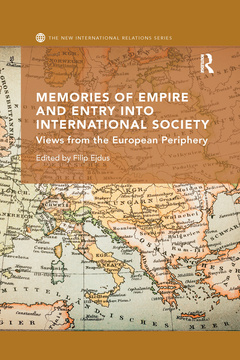Memories of Empire and Entry into International Society Views from the European periphery New International Relations Series
Coordonnateur : Ejdus Filip

What is the role of memories for the expansion of international society? By drawing on the English School approach to International Relations this edited volume argues that the memories of empire and suzerainty are key to understanding sociological aspects of the expansion of anarchical society. The expert contributors adopt a socio-historic conceptualization of entry into international society, aiming to move beyond the legalist analysis, and also explore the impact of identity-constructions and collective memories on the expansion of international society.
Empirically, the volume investigates the entry into international society of Belarus, Bulgaria, Greece, Poland, Serbia, Slovakia and Romania and studies memories that they activated along the way. While these memoires of bygone polities were used by state builders to make sense of international society and legitimise claims of the new entrants, they inadvertently also generated tensions and anxieties, which in many ways persist until this day. Both the theoretical angle and the empirical material presented in this volume are novel additions to the growing body of knowledge in historical International Relations.
Exploring how memories and experiences of the past still complicate the entrants? positions in international society and to what degree ensuing tensions remain today, this volume will be of interest to students and scholars of European International Relations, particularly those with a focus on Eastern Europe.
1. Introduction
[Iver B. Neumann]
2. Belarus’ Entry into International Society: Between a Small Nation-State and Big Narratives
[Aliaksei Kazharski]
3. Bulgaria’s (Re)Entry into International Society
[Dimitar Bechev]
4. Greece’s Entry into International Society
[Yannis A. Stivachtis]
5. Through the East to the West: Poland’s (re)entry into international society and the sway of memories of the Polish Golden Age
[Dominika Woźniak]
6. From Dacia to Modern Europe: imagined temporal bridges and the politics of identity construction
[Alexandra Gheciu]
7. Memories of Empire and Serbia’s Entry into International Society
[Filip Ejdus]
8. Slovakia’s Layered Entry into International Society and the Possibilities of its Exit
[Jozef Bátora]
9. Conclusion
[Filip Ejdus]
Filip Ejdus is a Marie Curie Research Fellow at the School of Sociology, Politics and International Studies (SPAIS), University of Bristol, UK, and an Assistant Professor at the Faculty of Political Sciences, University of Belgrade, Serbia.
Date de parution : 09-2021
15.6x23.4 cm
Date de parution : 05-2017
15.6x23.4 cm
Thèmes de Memories of Empire and Entry into International Society :
Mots-clés :
NATO Representative; Napoleon III; Ivan III; Pope Honorius III; European International Society; Suzerain System; Senior EU Official; Modern Romanian State; Great Moravian Empire; Kyivan Rus; Polish Eastern Policy; Romanian Principalities; Eastern Slavic Lands; Translatio Imperii; Outer Tier; Great Moravia; BSSR; Pope Innocent Iii; NATO Enlargement; Southeastern European States; Medieval Memories; Grand Duchy; Belarusian Nation; Eastern Borderlands; Belarusian Nationalism



